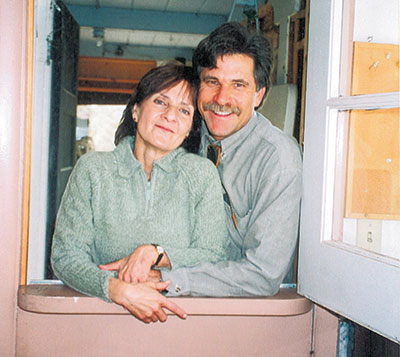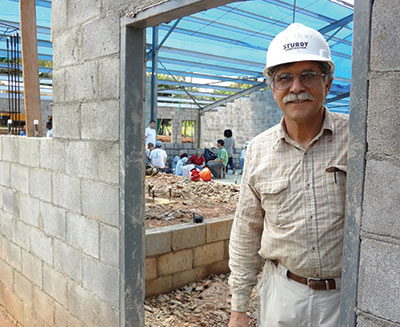
If you’ve met Luther Findley lately, it seems that every word and action is filled with humility and seems to rotate around God as the center of it all. “It’s hard to be lost while you’re serving others,” says Luther, a soft-spoken man whose life has been dedicated to service nearly 24 hours a day for the past several years. But life didn’t always follow this pattern. Luther has undergone a complete turnaround, from addict to missionary.
Luther had a rough start in life, to say the least. His father fought in World War II and came back a different person, often beating his children. When Luther was 12 years old, his father committed suicide, leaving his wife with six children trying to find their way.
Luther quickly found
his way into a lot of trouble. He attended Sacramento Union Academy (now Sacramento Adventist Academy), but was asked to leave. He then tried public school before he dropped out and got his GED. He was smoking pot at 13, and by 16 he was the best customer at the neighborhood liquor store. Luther soon fell deeper into addiction. As a young adult he was doing drugs all the time; he was unable to function or hold a job.
At home, Luther’s mother was praying. “Out of all her kids, my mother really didn’t hold out much hope for me,” says Luther. But change was coming in a way no one could have imagined.
“We both wanted to get out of drugs and alcohol, but it is so hard once you are involved.”
In 1988 Luther met a beautiful exotic dancer, and they started dating. Her name was Claire. “I really liked her,” he remembers. “We were both addicted to drugs and alcohol, so we got along pretty well!” But after one weekend of partying in the mountains, the two sobered up on the trip home and started to talk religion. She practiced Baha’i and spoke about reincarnation and other beliefs. Luther countered with the beliefs of his childhood. “I was giving her a Bible study right there!” he remembers.
“We both wanted to get out of drugs and alcohol, but it is so hard once you are involved,” says Luther. “You don’t set out to become a drug addict—it just sort of happens.” He suggested that the two go to Carmichael Adventist Church, where he had attended as a child. They went that very week, and Luther says his mother almost fell out of the pew. At Carmichael, Luther and Claire felt so loved that they kept coming back, week after week. They started Bible studies with the pastor and soon decided to marry and get baptized.
The couple’s drug-free life was very different from their past. Claire studied to become a nursing assistant, and Luther started a construction company with his brother. In time they were completing million-dollar jobs all over California.
Luther and his brother were gaining a reputation as quality roofers and effective contractors. In 1994 a friend invited them to a volunteer construction project with Maranatha Volunteers International in Monterey, California, that coincided with Maranatha’s annual convention. Luther remembers being inspired and excited about using his talent for God. From then on he started attending Maranatha volunteer projects almost every year, often taking his son along. He loved supporting missions however he could. But work with his company became more and more stressful, threatening the most important relationships in his life: with God and with his wife.
In 2005 Claire began to feel sick and weak. At first she attributed it to side effects of a medication she was taking. But it kept getting worse. Her arms got so weak that she could not open pill bottles, and when she almost dropped a patient at her job as a nursing assistant, she had to quit her job.

It was two years before doctors found a diagnosis for Claire’s ailment. She had Lou Gehrig’s disease [ALS], an incurable neurodegenerative disease that affects nerve cells in the brain and the spinal cord. Claire’s muscles were progressively losing the ability to receive stimulus from the brain and atrophying.
ALS progresses differently in different bodies. Claire lost the ability to move her arms at first, but she could still walk and talk. The couple counted this as a blessing. But over time the muscle death continued to spread. Luther had to quit working in 2007 to care for his wife, supporting her to walk, eat, and, eventually, turn over. By 2011 Claire was incredibly frail and almost completely immobile. She relied on a feeding tube and respirator to stay alive.
As if dealing with Claire’s impending death was not enough, the bank was foreclosing on their home. Both had quit their jobs because of Claire’s disease, but the bills kept coming. Then in late 2011 a local reporter heard about their story and interviewed the couple. The local newspaper, the Sacramento
Bee,published a moving photo essay on their plight—photographs that showed Luther caring for his now-paper-thin, motionless wife. Within days the bank called to say they would postpone the eviction. The couple would be allowed to stay until after Claire’s death.
“At the end she could move only her thumb and her toes a little bit,” says Luther. “But she could talk right up until the end. That was a blessing. A little bit before she died, she looked up in my eyes and said, ‘I’ll see you in heaven.’ ”
Claire had just turned 60 years old.
After five years of caring for his wife nearly 24 hours a day, Luther was alone. Jumping back into the life he used to have just didn’t feel right. Within a few months of Claire’s death Luther moved out of their house and in with his mother. The bills were pouring in, and Luther took a few small jobs to make some money, but his heart was elsewhere. “I just wanted to volunteer,” says Luther. On his many projects with Maranatha he had always felt at peace. “The spiritual high you get doing mission trips, being stretched to the limit beyond your own capacities and relying upon God. . . . We see miracles every day,” says Luther. “When you go to the same job—the same place—every day, you get in a rut.”
Luther had even mentioned the plan to Claire before she passed away. The couple had spent hours in conversation. “She said she wanted to pick me out a new wife. I said, ‘I don’t think that will be necessary.’ I thought with the kids grown up and not having a wife, it would be a lot easier to do mission projects. I told her, ‘After you are gone I would like to work with Maranatha.’ She liked that idea.”
After years of learning to lean completely on God, Luther was ready to trust Him to care for his needs. And as soon as he made up his mind to dedicate his talents to the Lord, he got a call. A reporter in Bakersfield, a city in central California, called to ask how he felt about the school raising money for him. “What school?” asked Luther. A newspaper in Bakersfield had reprinted his story from the Sacramento
Bee, inspiring a local Catholic school to collect funds for him. The students had raised nearly $22,000. All Luther could say to the reporter was “Praise God!”
The donations helped pay bills and funded Luther’s airfare to Nicaragua, where he participated in three Maranatha projects in 2012. He also helped Maranatha in Zambia that year. While back in California, he kept busy by volunteering on a local project. The Samoan Seventh-day Adventist church in Sacramento was in the process of converting an old medical office into a church building. Luther got involved when the project supervisor, Bob Holmes, needed someone to shepherd the project during his vacation. Luther stayed on long after Bob’s vacation, spending almost every day at the site, not only constructing a building but also building people.
“I just think of Maranatha’s mission statement—building people through the construction of urgently needed buildings. What a miracle it is! I have been in construction a long time, and doing multiple jobs, trying to keep everything going, and keeping the jobs staffed is a lot of work. That Maranatha construction has all these jobs going concurrently all over the world is a miracle!” says Luther.
In 2013 Luther also made time for several other projects with Maranatha, including renovations at Weimar in California, a roofing project at the Malamulu Adventist Hospital in Malawi, and other Maranatha projects in the Dominican Republic, India, Nicaragua, and Zambia. He has been a nearly full-time volunteer with Maranatha for the past two years, lending his quiet leadership and expertise to project after project. Most recently he has begun working full-time maintaining the facilities at Sacramento Adventist Academy, where he attended school decades ago. He considers his daily interactions with students there another facet of mission work.
Luther’s talents in construction are accompanied by something much more rare: a true and tested faith in God. Luther draws inspiration for a simple, God-led life by watching those around him. “The people over in Africa, they are just content with what they have. Even though they just live in mud-brick houses with a thatch roof. There is no bathroom or kitchen, but they are content and happy, even more so than we are. I see that too in India and the Dominican Republic. That always amazes me.”
Luther has told his story again and again to individuals working alongside him, or at evening worship with Maranatha teams. “Some people say that it is amazing how my testimony touches different people’s lives in different ways.” From experience in an abusive home to drug addiction, job stress, and loss of a spouse, his life resonates with the struggles of many. His story has become another way his life can serve others.
“I’ve decided I’m just going to devote my talents to the service of God. You can do that through working, but you get so caught up and can lose your focus,” says Luther. “As long as God keeps opening doors, that’s what I want to do. It is just a blessing that I am able to do this. Just letting God handle it is really enjoyable.”
While Luther was working one day at the Samoan church project in Sacramento, a woman entered the building. She hadn’t been there for months. She stopped short, surprised by the huge changes, and began to weep.
“It was better than a paycheck,” says Luther. He really means it.